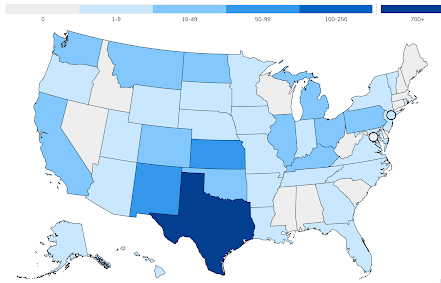A couple of recent articles show the impact of massive public-health failures on the part of both the state of Texas and the federal government. And in both instances, public-health failures undoubtedly resulted in avoidable deaths.
1. Emergency obstetrical interventions delayed or withheld. Marin Wolf and her colleagues at the Dallas Morning News have published a series of articles ("Standard of Fear") beginning in the paper's Sunday (8/24) edition and continuing in the Monday (8/25) edition. (Warning: possible paywall.) An overview:
More than a year ago, The Dallas Morning News set out to explore how Texas’ overlapping abortion laws have altered the landscape of obstetric health care. Through more than 100 interviews with physicians and other health care professionals, researchers, advocates, legal experts, patients and family members, reporters documented deviations from the standard of care, as well as other unintended consequences.
A review of hundreds of pages of medical and death records, including the examination of more than a dozen patient cases, revealed how the laws have been sweeping in their collateral damage — with patients, families and medical providers caught in the middle.
Texas lawmakers have accomplished what they set out to do — criminalize and, thus, drastically reduce access to abortion. But in doing so, they have also derailed medical care for women trying to have children who developed heartbreaking or life-threatening problems in their pregnancies.
Many women — including those who never imagined they would want or need an abortion — have faced delays or denials of treatment. This includes patients with preexisting medical conditions that make pregnancy dangerous, ectopic pregnancies, miscarriages, the onset of labor before a fetus is viable and fetal diagnoses that are lethal or life-limiting. Others have grown too afraid of becoming pregnant in Texas — so much so that there has been an increase in surgical sterilizations.
In a state that leads the nation in maternal mortality, how can legislators possibly justify interfering with women's autonomy and making it more difficult to obtain potentially life-saving emergency obstetrical care?
2. CDC dropped the ball on the West Texas measles outbreak. KFF News published an article this morning ("As Measles Exploded, Officials in Texas Looked to CDC Scientists. Under Trump, No One Answered.") that documents the impact of Trump-era cuts in staffing and funding at the Centers for Disease Prevention and Control. Here are some excerpts:
As measles surged in Texas early this year, the Trump administration’s actions sowed fear and confusion among CDC scientists that kept them from performing the agency’s most critical function — emergency response — when it mattered most, an investigation from KFF Health News shows.
The outbreak soon became the worst the United States has endured in over three decades. . . .
Delays have catastrophic consequences when measles spreads in undervaccinated communities, like many in West Texas. If a person with measles is in the same room with 10 unvaccinated people, nine will be infected, researchers estimate. If those nine go about their lives in public spaces, numbers multiply exponentially.
The outbreak that unfolded in West Texas illustrates the danger the country faces under the Trump administration as vaccination rates drop, misinformation flourishes, public health budgets are cut, and science agencies are subject to political manipulation.
And here's the kicker:
While the Trump administration stifled CDC communications, health secretary Robert F. Kennedy Jr. fueled doubt in vaccines and exaggerated the ability of vitamins to ward off disease. Suffering followed: The Texas outbreak spread to New Mexico, Oklahoma, Kansas, Colorado, and Mexico’s Chihuahua state — at minimum. Together these linked outbreaks have sickened more than 4,500 people, killed at least 16, and levied exorbitant costs on hospitals, health departments, and those paying medical bills.
The federal-state public-health partnership was based upon indispensable monitoring data and expertise that could be mobilized in an instant to support local public-health officials working in affected communities to limit the damage of infectious disease. Instead, a bunch of no-nothings in this administration are ushering in a new Dark Age of illness and premature death.
Elections have consequences.











